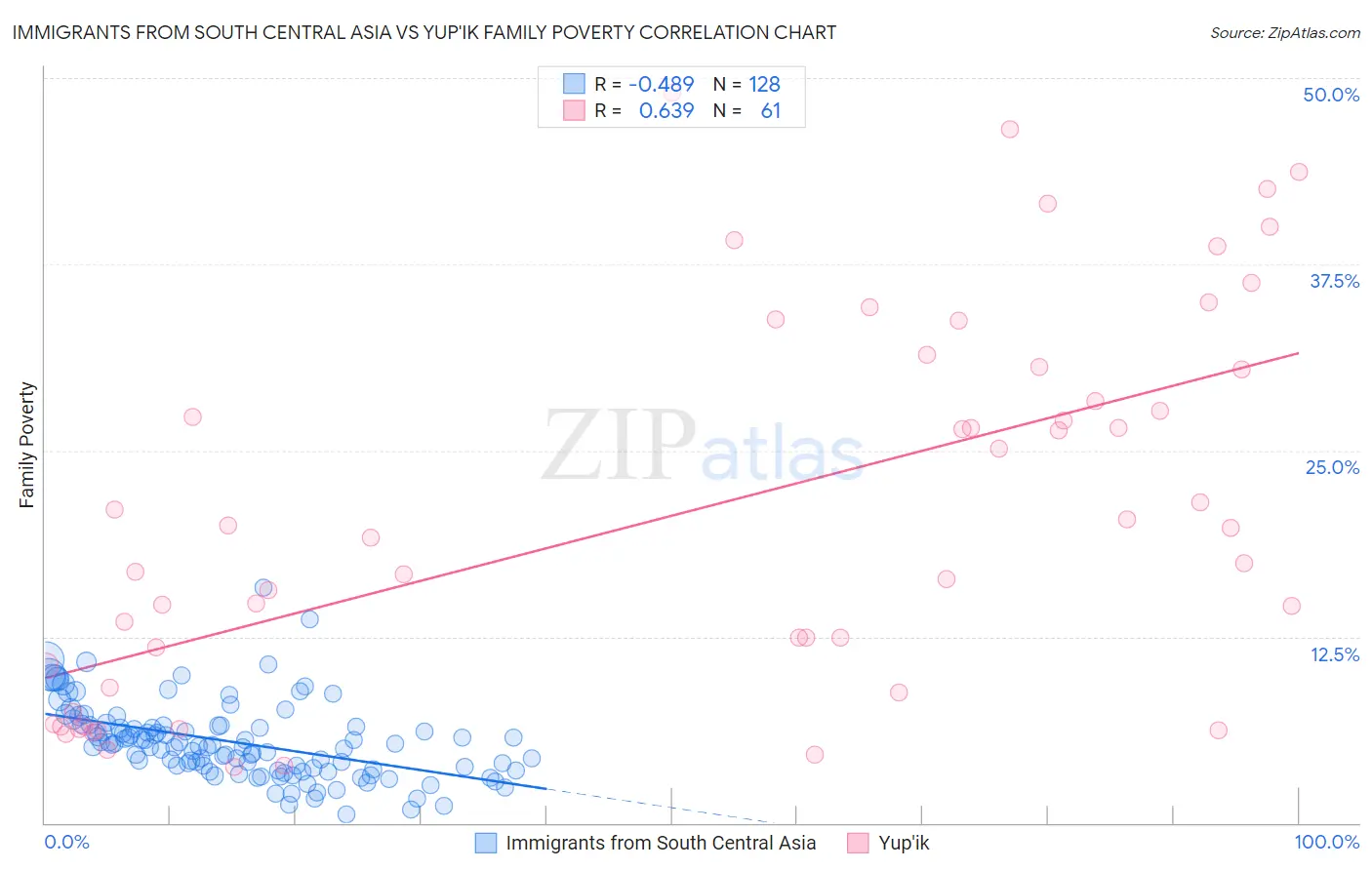Immigrants from South Central Asia vs Yup'ik Family Poverty
COMPARE
Immigrants from South Central Asia
Yup'ik
Family Poverty
Family Poverty Comparison
Immigrants from South Central Asia
Yup'ik
7.2%
FAMILY POVERTY
99.8/ 100
METRIC RATING
16th/ 347
METRIC RANK
18.7%
FAMILY POVERTY
0.0/ 100
METRIC RATING
344th/ 347
METRIC RANK
Immigrants from South Central Asia vs Yup'ik Family Poverty Correlation Chart
The statistical analysis conducted on geographies consisting of 471,025,257 people shows a moderate negative correlation between the proportion of Immigrants from South Central Asia and poverty level among families in the United States with a correlation coefficient (R) of -0.489 and weighted average of 7.2%. Similarly, the statistical analysis conducted on geographies consisting of 39,939,403 people shows a significant positive correlation between the proportion of Yup'ik and poverty level among families in the United States with a correlation coefficient (R) of 0.639 and weighted average of 18.7%, a difference of 159.6%.

Family Poverty Correlation Summary
| Measurement | Immigrants from South Central Asia | Yup'ik |
| Minimum | 0.60% | 3.7% |
| Maximum | 15.8% | 49.0% |
| Range | 15.2% | 45.2% |
| Mean | 5.4% | 20.8% |
| Median | 5.2% | 19.1% |
| Interquartile 25% (IQ1) | 3.7% | 8.9% |
| Interquartile 75% (IQ3) | 6.5% | 30.5% |
| Interquartile Range (IQR) | 2.9% | 21.6% |
| Standard Deviation (Sample) | 2.5% | 12.7% |
| Standard Deviation (Population) | 2.5% | 12.6% |
Similar Demographics by Family Poverty
Demographics Similar to Immigrants from South Central Asia by Family Poverty
In terms of family poverty, the demographic groups most similar to Immigrants from South Central Asia are Luxembourger (7.2%, a difference of 0.22%), Immigrants from Lithuania (7.2%, a difference of 0.24%), Lithuanian (7.2%, a difference of 0.27%), Eastern European (7.2%, a difference of 0.54%), and Immigrants from Hong Kong (7.3%, a difference of 0.70%).
| Demographics | Rating | Rank | Family Poverty |
| Latvians | 99.9 /100 | #9 | Exceptional 7.1% |
| Bulgarians | 99.8 /100 | #10 | Exceptional 7.1% |
| Immigrants | Singapore | 99.8 /100 | #11 | Exceptional 7.1% |
| Maltese | 99.8 /100 | #12 | Exceptional 7.1% |
| Swedes | 99.8 /100 | #13 | Exceptional 7.1% |
| Iranians | 99.8 /100 | #14 | Exceptional 7.1% |
| Lithuanians | 99.8 /100 | #15 | Exceptional 7.2% |
| Immigrants | South Central Asia | 99.8 /100 | #16 | Exceptional 7.2% |
| Luxembourgers | 99.8 /100 | #17 | Exceptional 7.2% |
| Immigrants | Lithuania | 99.8 /100 | #18 | Exceptional 7.2% |
| Eastern Europeans | 99.7 /100 | #19 | Exceptional 7.2% |
| Immigrants | Hong Kong | 99.7 /100 | #20 | Exceptional 7.3% |
| Immigrants | Iran | 99.7 /100 | #21 | Exceptional 7.3% |
| Danes | 99.7 /100 | #22 | Exceptional 7.3% |
| Assyrians/Chaldeans/Syriacs | 99.7 /100 | #23 | Exceptional 7.3% |
Demographics Similar to Yup'ik by Family Poverty
In terms of family poverty, the demographic groups most similar to Yup'ik are Navajo (18.8%, a difference of 0.55%), Pima (18.4%, a difference of 1.8%), Immigrants from Yemen (17.5%, a difference of 7.1%), Puerto Rican (20.3%, a difference of 8.6%), and Tohono O'odham (20.4%, a difference of 9.0%).
| Demographics | Rating | Rank | Family Poverty |
| Immigrants | Dominican Republic | 0.0 /100 | #333 | Tragic 14.4% |
| Houma | 0.0 /100 | #334 | Tragic 14.6% |
| Apache | 0.0 /100 | #335 | Tragic 14.7% |
| Sioux | 0.0 /100 | #336 | Tragic 15.9% |
| Hopi | 0.0 /100 | #337 | Tragic 15.9% |
| Crow | 0.0 /100 | #338 | Tragic 16.1% |
| Yuman | 0.0 /100 | #339 | Tragic 16.6% |
| Pueblo | 0.0 /100 | #340 | Tragic 17.0% |
| Lumbee | 0.0 /100 | #341 | Tragic 17.0% |
| Immigrants | Yemen | 0.0 /100 | #342 | Tragic 17.5% |
| Pima | 0.0 /100 | #343 | Tragic 18.4% |
| Yup'ik | 0.0 /100 | #344 | Tragic 18.7% |
| Navajo | 0.0 /100 | #345 | Tragic 18.8% |
| Puerto Ricans | 0.0 /100 | #346 | Tragic 20.3% |
| Tohono O'odham | 0.0 /100 | #347 | Tragic 20.4% |